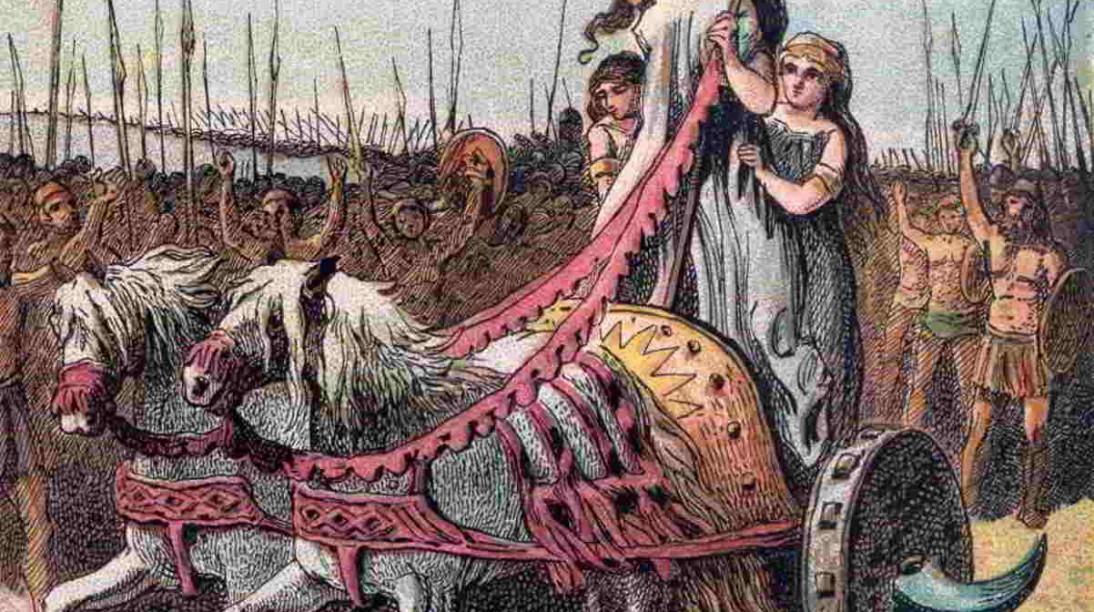What Boudicca tells us about the new normal

Don't wait for the Reset
Welcome to the Edit, our regular scrutiny of language and communications. There is much talk of a Reset, a change in the way we live. History, right back to the Roman Empire, suggests otherwise.
Londinium was booming. Nero had become emperor in AD 54 and tax cuts were on the way.
A poem* imagines a trader’s high hopes in the city that would become London:
Soon Nero will abolish all taxes.
This town is booming. Our fortunes with it.
Little did he know.
Good times weren’t round the corner. Instead, a rebel queen in a chariot.
A couple of years later, in AD 60-1, Boudicca razed London – and all of its businesses – to the ground. Every occupant was slaughtered. Archaeologists can identify an event horizon – a layer of ash where wooden buildings had stood.
It was surely the end. Londinium was gone and commerce with it.
No so.
Within a decade the city was rebuilt and once again a bustling trading centre. So it stayed for the next two millennia.

This notion that things can never be the same is prevalent now, during the Covid-19 crisis.
This is a Reset, its adherents say. Capitalism and western democracy, they reckon, will emerge into the post-lockdown sunshine changed.
Covid-19 is undoubtedly a different crisis. But is the notion of the Reset true? We suspect not.
This time it's different? Perhaps ...
Some things will change. With the jaw-dropping sight of a screen showing negative oil prices, it looks like peak fossil fuel may truly have come.
Covid-19 may also, sadly, sound the death knell of much bricks-and-mortar retail. Highbrook fears for the future of print newspapers.
Past crises, of course, have changed things for the better. After the first world war, some women over 30 got the vote. After the second, the NHS was created.
The idea of Reset is, however, mainly wishful thinking. Wouldn’t it be lovely if we led quieter, greener, more frugal lives where we can breathe clean air and think?
There will, however, be no Reset. We will get back to our noisy, pushy, anxious lives as soon as we can. Just as we have after war, financial crashes, fire, famine and plague.
Previous resets, but not really
After almost every crash, including 2008, there was talk of capitalism ending. It didn’t. It was back pretty soon with a new suit courtesy of quantitative easing.
Why? Because it’s what we do. We are born traders, socialisers and aggregators. Since the dawning of agriculture, we have gathered to buy and sell, to exchange labour, skills and capital.
It’ll take a year or two to get back to normal. Commerce will be chastened. It’ll behave itself for a while. Just for a while.
Commerce isn’t a foul aberration. It’s the messy, sometimes unpleasant compromise we make to live fairly peaceful, stable lives. Just like the traders of Londinium.
* From In the Second Consulship of Nero by Jo Balmer, based on historic writing tables found in the City of London
Mind your language

“This virus does not discriminate,” Michael Gove, Dominic Raab and other ministers like to tell us at their daily briefings. On the contrary, says the BBC’s Emily Maitlis, “the disease is not a great leveller”.
And another well-known writer commented in a private social media post, “the virus is more single-minded than we humans”.
They are all wrong, of course. Covid-19 is just a piece of protein replicating itself. It is not capable of discriminating; it has no mind, single or otherwise.
We need to be careful with imagery, especially when talking about the sick and dying. Maitlis’s outburst was prompted by the comment that Boris Johnson would survive because “he’s a fighter”. “You do not survive the illness through fortitude and strength of character, whatever the prime minister’s colleagues will tell us,” she said.
Much of the language used about the virus has been couched in terms of a war. But there is no malevolent enemy, no battle, just nature. And to imply, even accidentally, that people who die from disease are less heroic than those who survive is wrong and insulting.
Word of the month: Cascade
In emails, as in: “Please can you cascade the following information to your staff...” We hate the implied superiority. “Forward” would do fine, as would “send”, “pass” or plain old “give”.
Seamless and ponderous
Meanwhile out in the unreal world, the ponderous proliferates unabated. Take this from Fintech Futures: “We all live lives of contradictions and halves that won’t meet in a seamless hole. Be it our personal and professional choices, the kind of work we strive to do and the places in which we try to do it. Be it what the world expects of us and the way we choose to defy, challenge, undercut or ignore those expectations.”
And there’s plenty more where that came from.
Why you need editors (part 326)

The Financial Times prides itself on a superior journalism, but even it is not impervious to the odd homophone blunder. Everyone is. Everything needs a second or third pair of eyes. Their, their.
Who’s counting?
New York ad agency Small has been telling LinkedIn about the importance of keeping things tight: “We call it the 12-word rule. Whenever we have an idea we like, we try and see if we can summarise it in a 12-word headline, which is the average length of headlines on online outlets. If it doesn’t fit in 12 words, then the idea is too complicated and no one will ever write about it. As simple as that. It’s often a painful process, but only the best ideas survive the test. And those ideas are the most likely to become famous.”
Is it mean-spirited of Highbrook to point out that their explanation is considerably more than 12 words?
Want to talk? Email us at info@hbrk.co.uk or call 0207 525 9591.





